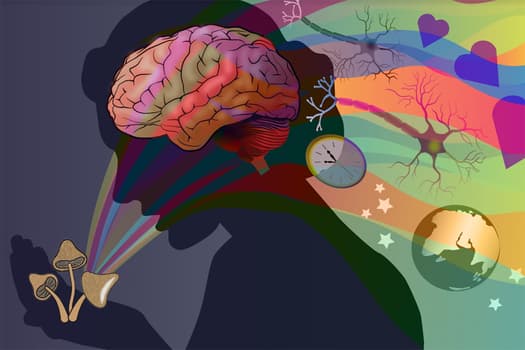A naturally occurring psychedelic compound found in “magic mushrooms” can help treat depression, according to a key study.
The second phase of a major study of the hallucinogen psilocybin – a psychedelic compound found in several species of psilocybe mushrooms, otherwise known as “magic mushrooms” – as a treatment for depression showed again that it’s effective for many people, and that the higher the dose, the more effective it was.
Published today in The New England Journal of Medicine, the trial provided “the strongest evidence so far to suggest that further, larger and longer randomized trials of psychedelics are justified,” University of Edinburgh biological psychiatry professor Andrew McIntosh, MD, told The BBC. “Psilocybin may [one day] provide a potential alternative to antidepressants that have been prescribed for decades.”
The study authors noted that psilocybin’s antidepressant qualities were first noticed in studies involving patients with life-threatening cancer. Psilocybin research is hotly watched among mental health professionals seeking to help those with treatment-resistant depression, as most mainstream treatments are only effective for a modest share of depression patients.
“The findings are both intriguing and sobering,” Harvard Medical School professor of psychobiology Bertha K. Madras, PhD, wrote in a response to the study.
This was phase II of the study, where researchers evaluate different dosages of psilocybin. Phase II enrolled 233 people, who were randomly assigned one of the following doses: 1 milligram, 10 milligrams, or 25 milligrams. (The study used a pharmaceutical-grade synthetic psilocybin formulation called COMP360.)
On the day they got the drug, participants spent up to 8 hours with a trained therapist until the effects wore off. They also met with their therapists during the 12-week study period after treatment.
The compound’s potentially dangerous side effects – even amid long hours of sitting in a living room-like setting with a therapist after treatment – have some medical professionals skeptical that it can work as a mainstream treatment.
Madras noted that while the study showed that psilocybin can treat depressive symptoms, the drug helped a lower share of people in the study, compared to large trials for conventional antidepressants. She also cautioned that in this latest psilocybin study, up to 84% of participants (depending on dosage) had side effects, with a few “reporting suicidal ideation or self-injurious behavior.”
The study authors concluded that “longer and larger trials, including comparison with existing treatments for depression, are required to determine the efficacy and safety of psilocybin for treatment-resistant depression.”


